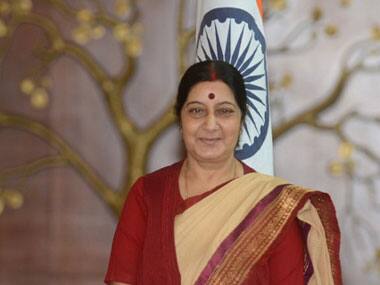External Affairs Minister Sushma Swaraj will be in South Korea this weekend, a visit imbued with lot of strategic significance considering New Delhi’s growing defence and economic relationship with Seoul in recent years. China will inevitably be the elephant in the room when Swaraj holds talks with her South Korean interlocutors on 29 December.
[caption id=“attachment_1854277” align=“alignleft” width=“380”]  Sushma Swaraj. AFP[/caption]
Sushma Swaraj’s main task in Seoul would be to co-chair along with her South Korean counterpart a meeting of the Joint Commission for bilateral cooperation that was set up way back in 1996. The India-South Korea Joint Commission meetings have been rather infrequent and only seven such meetings have been held in the last 18 years. That should give an idea about the importance of this meeting.
However, an important agenda for Swaraj in Seoul would be to prepare for a visit to South Korea by Prime Minister Narendra Modi. Seoul is eagerly anticipating Modi’s early visit to the country.
PM Modi’s diplomatic calendar is already quite crowded in the coming New Year. United States President Barack Obama’s scheduled India visit in the last week of January and presentation of the union budget in the month after would rule out his visit to South Korea in the first two months of 2015.
But the Koreans are still pitching for an early visit by Indian PM to Seoul. South Korean President Park Geun-Hye, the first woman president of the country, had paid a four-day state visit to India in January 2014. The Koreans are keen on annual summits with India for quite some time, though it has not fructified.
In April, PM Modi is scheduled to embark on his maiden visit to Germany. Around that time he is also expected to visit Canada and the United Kingdom also, though the exact dates are yet to be firmed up.
Modi’s visit to Israel is also at a nascent stage of planning. His possible Israel visit is going to be a diplomatic game changer of sorts, but one has to wait and watch when it materialises.
Coming back to South Korea, this country in the Far East is increasingly gaining importance in the Indian strategic calculus, largely because of the ubiquitous China factor.
Like Russia, with South Korea too India’s trade relations have gone down substantially. The two sides, despite having a Comprehensive Economic Partnership Agreement (CEPA) in place for some years, have witnessed a dip in their bilateral trade. The two sides had set an ambitious goal of having $40 billion bilateral trade by 2015 but their present trade is just around $17 billion.
This will be a major issue for the two sides to address and the Joint Commission meeting will likely set a new and more realistic trade target and prepare a roadmap to achieve it.
The Koreans are going to raise the issue of India recently canceling a billion dollar deal with South Korea for supply of eight Mine Countermeasure Vessels (MCMV) to Indian Navy on account of suspected irregularities. South Korean company Kangnam Corporation had worked hard for years for the minesweeper deal with the UPA government and had won the competition in 2008 by quoting the lowest price for the minesweepers.
It is quite likely that the Modi government would still encourage the South Koreans to execute the project for construction of eight MCMVs under the Make in India programme after signing a new contract with new conditions.
The South Koreans are increasingly getting inter-woven into the Indian growth story with deep focus on cooperation in many diverse areas like outer space, IT, science and technology, infrastructure, education, culture and defence.
The traditionally close bilateral relations between India and South Korea were elevated to a higher level during President Park Geun-Hye’s India visit (15-18 January, 2014) when she and her Indian counterpart unveiled a blue print for further expanding the political, security, defence, economic, scientific, technological, IT, cultural and people-to-people relations in their “Joint Statement for Expansion of Strategic Partnership”.
A significant feature of the India-South Korea strategic partnership is that the two countries have recently instituted a regular dialogue between their national security structures and their agreement to exchange classified military information.
The two sides set up a military wing in each other’s embassies in October 2012. This tells quite a lot about how rapidly the two countries have grown closer in defence and strategic matters.
China has watched these developments with some anxiety, though as of now the Chinese heckles are not raised as much about India-South Korea relations as they are about India’s ties with Japan and Vietnam.
But the fact is that South Korea, a fully developed country, is becoming increasingly important in the Indian strategic matrix. For this reason, India’s relations with South Korea are of crucial importance and Sushma Swaraj’s upcoming visit to Seoul would ensure that these ties go from strength to strength.


)

)
)
)
)
)
)
)
)



